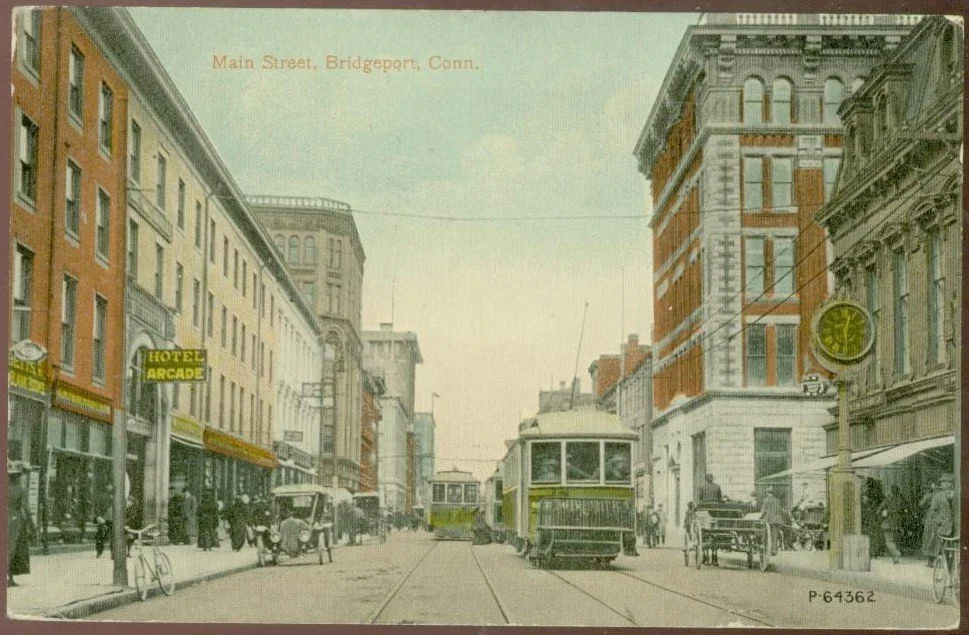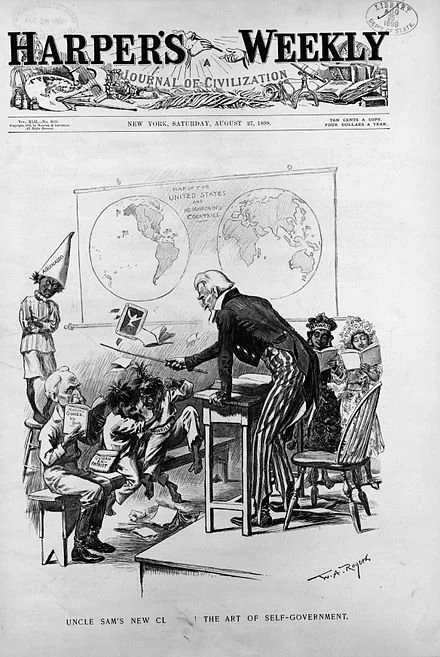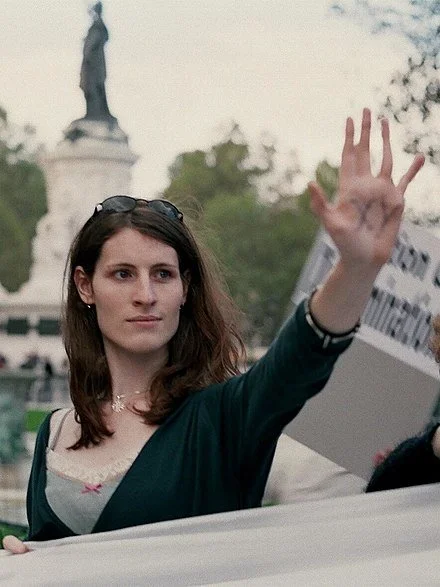
Chris Powell: Totalitarian ‘climate-change’ protestors
Climate-change protestors in Germany.
Cromwell Meadows, in Cromwell, Conn.
MANCHESTER, Conn.
When, in 1955, Rosa Parks, a courageous Black woman, refused to give up her seat to a white passenger on a bus in Montgomery, Ala., was arrested, and dramatically advanced the modern U.S. civil-rights movement, the connection between her protest and her objective was clear: to end the racial segregation maintained by the bus service.
When, in 1960, courageous Black college students sat down at the white sections of racially segregated lunch counters throughout the segregated South and refused to leave until they were served, the connection between their protest and their objective was clear again: to end the racial segregation maintained at of lunch counters.
In those protests and many others during that era, the demands of the protesters could be easily granted by the targets of the protest without any loss or harm to anyone.
But what is to be construed from the sort of protest that is erupting in Western Europe and now the United States, such as the protest that disrupted the final minutes of play at the Travelers Championship golf tournament in Cromwell, Conn., two weekends ago? The protesters, wearing shirts with the legend "No golf on a dead planet," ran onto the putting green and sprayed colored powder on it before police intercepted them, took them away, and charged them with criminal mischief.
The protesters in Cromwell want to eliminate oil and natural-gas fuels, in the belief that those fuels are causing devastating "climate change." In other venues such protesters are defacing paintings and statues. But the golf tournament, a major money-raiser for charity, and the defaced paintings and statues have no special connection to fuel use and their operators and custodians have no special responsibility for fuel policy. They don't use oil and gas any more than everyone else does.
Sometimes fuel protesters block roadways, halting traffic. Of course most vehicles use fuel, but most of their operators of the vehicles being blocked use fuel no more than everyone else does.
The fuel issue is a society-wide issue but the targets selected by the fuel protesters are not objectionable by the protesters' own standards, and hindering them won't affect fuel policy. The protesters have selected the targets instead for their capacity to cause annoyance when impaired and thus generate publicity.
But the fuel issue long has been getting plenty of publicity quite apart from the efforts of the protesters. It is a major political controversy in the United States and Western Europe, where it is politically correct to imagine that there are readily available and adequate alternatives to oil and natural gas. But fuel is not a political controversy in most of the rest of the world, and especially not in the developing world, which will be needing not just oil and natural gas but also coal, the dirtiest conventional fuel, for decades to come.
Calculating the benefits and harms of conventional fuels and striking a balance between them is a task for democratic politics. But the fuel protesters are so sure they are right, and so self-righteous, that they claim the right to nullify the rights of all people who disagree with them or don't heed them.
These protests go far beyond civil disobedience. They go far beyond criminal mischief as well. They are totalitarian. and any prosecutor who pursues the criminal charges from the golf tournament, and any court that tries them, should keep this in mind.
MORE SCHOOLS CRASH: Add Stamford to the list of Connecticut cities whose schools are getting out of control.
Teachers at Stamford's Turn of River Middle School say that they are being abused, bullied, threatened, and even assaulted by students, adding that the school administration has failed to report the assaults to the police.
The administration says it will make changes, including adding a third security officer to the school. That officer is needed not to protect the school against outsiders but against its own students, since under Connecticut law even the most disruptive students are almost impossible to expel, lest their feelings be hurt and the public notice social disintegration.
Chris Powell has written about Connecticut government and politics for many years (CPowell@cox.net) .
Chris Powell: Hartford’s new archbishop eyes the poverty factory
Archbishop Christopher J. Coyne
Cathedral of Saint Joseph in Hartford
— Photo by Sage Ross
MANCHESTER, Conn.
When he was installed two weeks ago, Hartford’s new Catholic archbishop, Christopher J. Coyne, said he has several big objectives, though he conceded that with two of them he may be dreaming.
Coyne’s most practical objective is simply restoring the local church and regaining parishioners. "In recent years," Coyne said, "we have given folks no shortage of causes to walk away from the faith -- parish closings, the abuse scandal and associated betrayals by leaders who should have known and done better, and pastoral approaches that at times have done more to judge people than serve them."
The archbishop can’t undo those scandals but he can be candid about them and make sure that the wrath of God quickly falls -- publicly -- on any agents of the archdiocese who betray their trust.
As for unhappy judgments on people, archbishops are stuck with church doctrines that many think contradict modernity, such as the refusal to ordain women or sanction same-sex relationships. Given the conservative bent of the places where the church is growing, those doctrines are unlikely to be changed soon.
Not that modernity is always right. Indeed, the basic Catholic morality of old is less primitive than today’s morality of anything goes. It wasn’t entirely because of religious doctrine, but Connecticut was better before state government started pushing gambling and marijuana on the public and pretending that men can be women and vice-versa.
Sad as Catholic parish closings are, ripping roots out of the community and leaving empty buildings as stark monuments to a vanished era, the decline in church membership requires closings and it has not been caused primarily by the scandals. While spirituality is not dead in the developed world, religious dogma is losing adherents fast. Perceptions of the divine today are much broader.
Fortunately the church has much to offer beyond dogma, starting with the Sermon on the Mount, and evangelical and non-denominational churches are growing. Catholic leaders might study their appeal.
In his inaugural remarks, the new archbishop noted that parish and school closings have left the church with many buildings that might be converted to inexpensive housing, of which Connecticut is desperately short. Of course this is easier said than done. While nearly everyone purports to want the state to have more housing, nearly everyone wants it built somewhere else. The fear of the underclass is real and often justified, as indicated by violent crime and terrible school performance in the cities.
The new archbishop has an idea about his new city, Hartford, a poverty factory where two high school students were shot to death the other day. His dreamiest objective is to restore Catholic schools in the city -- there are none left -- and make them tuition-free.
The excellence of Catholic schools is generally acknowledged. The schools have behavioral discipline and academic standards, which now are virtually prohibited in public schools. Unlike public schools, church schools can choose their students, but they use this freedom not to exclude but to pursue the most motivated students and parents.
Thus church schools can offer students an escape from the demoralization of city life, and with their better environment they can retain good staff while paying less than public schools.
Regional public "magnet" schools offer some escape as well but are still somewhat impaired in discipline and academic standards. They also impose more transportation burdens on students and parents than neighborhood schools.
In any case, as indicated by the litigation of the past quarter century over school segregation in Hartford, the city and other cities in Connecticut can use much more school choice. The return of Catholic schools could help provide it, but avoiding tuition would require money from somewhere.
A scholarship program from state government might provide it and educate students better and less expensively than government’s own system, but the teacher unions would never consent, and they run government in Connecticut. They have no interest in improving student performance, reducing poverty, and saving money. Only dreamers care about such stuff. Good for the new archbishop for being one.]
Chris Powell has written about Connecticut government and politics for many years (CPowell@cox.net).
Hell on the dirt
“Are You Not Entertained?” (oil on canvas), by Enfield, Conn.-based artist Devon Edwards, at Hartford Art School Galleries, West Hartford, Conn.
— Image courtesy of the artist
Enfield Shaker Village in 1910.
Chris Powell: The wild ‘Kia Boyz’ may represent Conn.’s grim future
Downtown Bridgeport in 1912. Bridgeport was an industrial powerhouse for decades.
MANCHESTER, Conn.
What may prove to be Connecticut's best journalism for many years was a 44-minute video documentary of sorts posted last week on YouTube by freelancer Andrew Callaghan and brought to the state's attention by CTCapitolReport.com.
Callaghan gained the confidence of three teenage gangsters from Bridgeport and video-recorded them on their daily rampages -- breaking into and stealing cars day and night throughout the state, speeding away wildly along highways and residential streets, risking death and the death of others, defeating police pursuit, and boasting that no one can catch them.
Of course the young gangsters might be caught, insofar as Callaghan repeatedly located them and even joined them at a government housing project in Bridgeport, where, he found, stolen cars are regularly being "sold" to other young gangsters for a mere hundred dollars or so, the contents of the cars having more value than the cars themselves, which are soon abandoned since they can't be acquired legally.
Apparently the Bridgeport police were not yet aware of or interested in the use of the housing project as a stolen car market. Nor, apparently, was Mayor Joe Ganim, though his recent re-election campaign was noted for soliciting absentee ballots from public-housing residents who may have feared that keeping their apartments required such cooperation with the regime.
Despite the harm they were doing, the kids seemed more lost and nihilistic than evil, glad that someone from another world was paying attention to them. As they sat on the roof of a small abandoned house, taking a break from their mayhem, Callaghan even got them to reflect briefly on their lack of parenting and particularly their lack of present fathers.
The young gangsters call themselves the Connecticut Kia Boyz, since most of their target vehicles are Kias, which became notorious for the ease of bypassing their ignition systems with a screwdriver and USB cable.
It is hard not to see the Kia Boyz as the country's future -- the vanguard of the ever-growing urban underclass, products of the family-destroying welfare system; of schools that pay their employees well but fail to educate because they can't educate when their primary policy is social promotion and parents are no help; and of a criminal-justice system that pretends that social work actually works and is preferable to imprisoning young repeat offenders, giving them what feckless state legislators call "the help they need" without ever defining or delivering it.
What the Kia Boyz and the hundreds of thousands like them around the country need most is parents. But no one in authority in Connecticut dares to inquire into what has happened to parents and particularly to fathers, and why. That's because such an inquiry might distress the many government employees and others who make their livings doing what doesn't work or even makes things worse.]
Anyone daring to inquire into the collapse of the family would also risk accusations of racism, since fatherlessness and poverty are racially disproportionate,.
So the country's nearly comprehensive abandonment of behavioral standards continues, worsened by the crushing pressure imposed on schools, hospitals, welfare agencies and government budgets by the millions of immigrants illegally entering the country in recent years.
Daniel Patrick Moynihan, the social scientist who became a great U.S. senator from New York, saw it all coming in the famous 1965 report that bears his name.
Moynihan wrote: "From the wild Irish slums of the 19th-century Eastern seaboard to the riot-torn suburbs of Los Angeles, there is one unmistakable lesson in American history: A community that allows a large number of men to grow up in broken families, dominated by women, never acquiring any stable relationship to male authority, never acquiring any set of rational expectations about the future -- that community asks for and gets chaos. Crime, violence, unrest, disorder -- most particularly the furious, unrestrained lashing out at the whole social structure -- that is not only to be expected; it is very near to inevitable. And it is richly deserved."
Six decades later Moynihan's prophecy is still ignored even as new horrors fulfill it almost every day.
Chris Powell has written about Connecticut government and politics for many years (CPowell@cox.net).
It will calm down
“Angry Nimbus” (limited edition fine art photograph), by Robert Thomas, at Spectrum Art Gallery, Centerbrook, Conn., a village in the town of Essex.
Early 20th Century postcard.
Chris Powell: More discipline would mean less racism in schools
Harper's Weekly cover from 1898 shows a caricature of school discipline.
MANCHESTER, Conn.
Cromwell, Conn., lately has been convulsing over a student's at-first anonymous public complaints about racist or abusive conduct by other students in school.
What was the first action taken in response by the school administration and the town's Board of Education? Of course it was to hire a consultant -- an expert in "diversity, equity, and inclusion."
Cromwell's school officials may have been surprised to discover that children can be bratty and even vicious quite apart from anything related to "diversity, equity, and inclusion." Any personal characteristics can be targeted by childish brattiness and viciousness. Race is just one of many such opportunities.
Nobody who has spent time with children needs a "diversity, equity, and inclusion" consultant to know that. But such a consultant will just help school officials look sincere.
If school officials were ever really sincere about misbehavior by students, instead of hiring a consultant they might make it a practice to have every student interviewed confidentially every month by a teacher, administrator, or guidance counselor and asked about any problems they were having in school. At these interviews students would be instructed in or reminded of the necessity of decent behavior and the penalties for misconduct.
Each meeting would be summarized in writing by the interviewer and the student would be invited to add his own comment before both acknowledged the summary in writing and the summary was placed in the student's file. Specific complaints by a student would be promptly investigated. Due process would be provided and formal judgment issued, and upon any finding of misconduct, punishment imposed on the perpetrator.
Schools in Connecticut have a miserable reputation on their response to bullying, perhaps because discipline in school has become politically incorrect, which may be the precursor to much of the racism and misconduct being complained about lately.
But the problem of bratty and vicious kids and ineffective school administration is an old one, and the General Assembly may be even more oblivious to it than Cromwell seems to be.
After testimony from parents, teachers, psychiatrists, and others about hateful conduct among school children, the legislature's Committee on Children recently proposed legislation to appoint a "task force" to study it. Apparently the need for more discipline in school has not occurred to the committee.
Some Democratic legislators have soared beyond obliviousness on the issue. They have proposed legislation to prohibit colleges and universities from questioning applicants about any criminal records and discipline for misconduct in high school. That's the Democratic Party's approach to crime generally these days: to conceal it in support of claims that crime is down as society disintegrates.
One hardly needs to consult an expert in "diversity, equity, and inclusion" to figure out what will happen when word reaches high school students about the law forbidding colleges and universities from questioning applicants about their misconduct. Misconduct will be liberated.
It's still early in the legislative session and craziness like the college legislation may be weeded out. But given the legislature's far-left Democratic majority, it's just as likely that the college legislation will be amended to impose fines and prison time on any admissions officer who asks an applicant if he has murdered anyone lately.
MORE HIDDEN FEES: Connecticut Gov. Ned Lamont has a great idea. He wants the General Assembly to pass legislation to prohibit hidden fees on event tickets, hotel and short-term rental bills, and food and beverage sale and delivery services, "fees that are tacked on at the end of a consumer's transaction."
But why stop there? For the biggest perpetrator of hidden fees in Connecticut is state government itself.
It's not just the "public benefits" charges concealed in electricity bills -- transferring to paying customers the cost of electricity used by customers who don't pay, along with charges for government undertakings irrelevant to electrical generation.
It's also the wholesale tax imposed on fuels and the cost of state mandates on medical insurance, health care, and municipal government, costs passed along discreetly to customers and taxpayers.
Concert tickets are the least of the scam.
Chris Powell has written about Connecticut government and politics for many years (CPowell@cox.net).
‘A farewell gesture’
Audubon Center Bent of the River trail in Southbury, Conn.
— Photo by Karl Thomas Moore
“March brings many things, but not hurricanes. But yesterday it brought a storm and a temperature drop, a farewell gesture from winter. The pipes froze again in the back part of the house. And as I viewed the solidly frozen bath mat in my shower, I felt I could do without any record-breaking statistics.’’
— Gladys Taber (1899-1980), in The Stillmeadow Road (1959), about life in her Southbury, Conn., farmhouse
Between dislocation and belonging
From Yvette Mayorga’s current show, “Dreaming of You,’’ at the Aldrich Contemporary Art Museum, in Greenwich, Conn.
The museum says:
“Inspired by her mother’s work at a bakery after immigrating to the United States from Jalisco, Mexico, Mayorga frosts thick acrylics onto sculptures and canvases with piping bags and icing tips to achieve delectable textures. … Mayorga’s handicraft intimately immerses the viewer in the tension between dislocation and belonging that defined her girlhood as a first-generation Mexican-American in the Midwest in the ‘90s and 2000s.’’
In Greenwich, displaying a violent world
“Samurai Helmet” (Japan’s Edo Period — 1603-1868), in the show “Arms and Armor: Evolution and Innovation,’’ at the Bruce Museum, Greenwich, Conn., March 7-Aug. 11.
The museum says:
‘‘‘Arms and Armor’ brings together historical weaponry and natural history specimens to highlight parallels between combat in the human and natural worlds.’’
Chris Powell: A Conn. fairy tale; hiding juvenile crime
A menstrual pad with wings
— Photo by Gsvadds
At Brookfield High School
MANCHESTER, Conn.
While few people were looking, and while most who were were too deceitful to explain or afraid to speak out, the Connecticut General Assembly passed, and Gov. Ned Lamont signed into law, a measure requiring public schools to distribute free feminine-hygiene products in at least one male restroom.
In anticipation of the law's date of implementation this coming Sept. 1, Brookfield's school administration installed such a vending device in a male bathroom at the town's high school. Boys being boys -- at least most of the time -- the other day some at the high school destroyed the device, thereby bringing the law more attention than it received while being enacted and causing Brookfield High Principal Marc Balanda to proclaim himself disgusted by the vandalism. Balanda called it "the work of immature boys, not men."
But whose work was the law itself? Responsibility rests with legislators and educators who want Connecticut to believe that there are no biological, anatomical, and psychological differences between male and female and that if people want to pretend about their natural gender, everyone else must pretend along with them.
The feminine-hygiene products dispenser law isn't the only manifestation of this pretense. The state Education Department advises schools to let students who consider themselves transgender use whichever restrooms they prefer. Some school systems direct their employees to keep a student's gender dysphoria secret from the student's parents if the student so desires. School athletic conferences require students claiming to be transgender to be allowed to participate in the sports of whichever gender they choose, though the policy remains under challenge in federal court by young women cheated out of championships by young men.
Everyone in Connecticut must pretend, on pain of denunciation or worse, as in Hans Christian Andersen's fairy tale, "The Emperor's New Clothes."
The law's advocates dishonestly defend it as a matter of helping poor students -- as if free feminine-hygiene products can't easily be made available in female restrooms and school offices rather than in male restrooms.
Brookfield's state senator, Stephen Harding, wants the legislature to consider repealing the law. But he approaches the issue as if it is just another excessive state mandate on municipalities, not an excess of political correctness. Can the pretense here ever be confronted at the state Capitol?
Gender dysphoria is a burden to those who suffer from it. Schools should ensure that no one suffering from it is denied ordinary rights or harassed. But neither should gender dysphoria be used to deny the long-established rights of others, like gender privacy in restrooms, parental responsibility, and equal opportunity for girls and women in sports. The pretense here makes government ridiculous.
xxx
Local television news reporters are good at showing up at a crime scene late, when witnesses have departed, and instead interviewing people who know nothing about the crime except what the reporters have told them. Typically the bystanders obligingly deplore the crime they didn't see and then are put on the evening newscasts.
But such silly journalism the other week was actually useful. A group of young people went on a car-theft spree, including a carjacking at a gas station in West Haven, and led police on a chase through several towns before being stopped back in West Haven. Some of the perpetrators ran off but police captured two 14-year-olds, one of them armed with a loaded handgun.
Pressed by a TV reporter to comment later, a woman who was pumping gas at the station where the carjacking occurred and had seen nothing speculated that the incident demonstrated the need for more "programs" for young people.
Many people may feel the same way. But while Connecticut long has had many "programs" for troublesome youths, their car thefts lately are more numerous than ever.
What exactly are the "programs" for 14-year-olds with guns stealing cars? How successful are they? Do any involve confinement or is that now forbidden? And how will people ever find out while state government keeps juvenile court secret?
Chris Powell has written about Connecticut government and politics for many years (CPowell@cox.net).
Chris Powell: Mutilation is mutilation; social-service industry complains about fiscal ‘guardrails’
Transsexual woman July Schultz displaying her palm with "XY" written on it at an demonstration.
MAN CHESTER, Conn.
What’s the difference between “female genital mutilation” and “gender-affirming care”?
“Female genital mutilation” is an ancient barbaric practice prevailing in some cultures in Africa and the Middle East. Some adherents mistakenly think that Islam requires it. It is committed against minor females and is euphemized as “purification.”
“Gender-affirming care” is the euphemism for sex-change therapy and is a modern barbaric practice associated with politically correct cultures in North America and Western Europe. It is committed against minors of both sexes and involves anatomy-altering drugs and surgery.
Female genital mutilation is prohibited by federal law and 41 states but not by Connecticut, so last week state legislators, 30 civic groups, and victims of the practice announced that they again will try to have it outlawed in the forthcoming session of the General Assembly. Legislators are rushing to endorse the proposal, though following the dubious practice of states that outlaw abortion, the advocates of outlawing female genital mutilation in Connecticut also want the law to criminalize taking a minor out of state for mutilation.
But meanwhile there is no effort in the legislature to prohibit “gender-affirming care” for minors, though Connecticut law presumes that minors lack the judgment to make such serious decisions, prohibiting them from purchasing alcohol, tobacco, and guns and from entering contracts and getting tattoos.
Medical research increasingly connects bad physical and psychological outcomes with “gender-affirming care,” and many who received it as minors come to regret it.
So in their consideration of female genital mutilation, legislators should ask why surgical and chemical mutilation and alteration shouldn’t be forbidden for all minors, delaying such practices to adulthood. What’s bad for the young goose is bad for the young gander as well, regardless of political correctness and however many other genders there are imagined to be.
DON'T WHINE, SPECIFY: Connecticut's social-services industry is complaining about the "fiscal guardrails” that state government has imposed on itself for the last few years at the behest of Gov. Ned Lamont and leaders of both parties in the General Assembly. The “guardrails” function as the limit on state spending that was promised as an apology for the state income tax in 1991 but was never delivered.
The industry has a point. Paid by state government, the industry provides many services that state government is obliged to provide and does so far less expensively than they would be provided by state government’s own employees, whose compensation is far higher than that of social-service organization employees.
But the industry's complaint is empty, for the industry never specifies any state spending that is less important than its own.
For many years state government has been primarily a pension-and-benefit society for its own employees. By law and union contract the compensation of state employees takes precedence over everything else in state government. Twenty percent of state government’s revenue now is used for government employee pensions, in part because for decades state government bought votes by overpromising while underfunding benefits. The social-services industry didn't object.
Even now much money could be transferred to social services if state government economized with its employees, as by freezing salaries instead of paying generous raises.
But the social-services industry doesn’t press for that either.
Indeed, practically every week brings an announcement from the governor about financial grants from the state to municipalities and other entities for discretionary purposes. Last week’s disbursements included $9 million for roads, sidewalks, and recreation trails in 10 small towns. No one would die if the money wasn’t spent that way. Without the state money the towns might proceed with some of the projects at their own expense.
But the social-services industry could make a plausible assertion that some of its underfunded work is a matter of life and death.
State government is never efficient. It is full of inessential, excessive and patronage spending. The social-services industry should try to earn more money by showing how it could be obtained without more taxes -- that is, by correcting state government’s mistaken priorities.
Chris Powell has written about Connecticut government and politics for many years (CPowell@cox.net).
Find shelter where you can
From Chiffon Thomas’s show “The Cavernous,’’ at the Aldrich Contemporary Art Museum, Ridgefield, Conn., through March 17.
The museum says:
“Chiffon Thomas’s first solo museum exhibition will unveil a new body of work, including the artist’s first public sculpture. Thomas’s interdisciplinary practice, spanning embroidery, collage, sculpture, drawing, performance, and installation, examines the ruptures that exist where race, gender expression, and biography intersect. Thomas’s practice is informed by his background in education, percussion, and stop motion animation, as well as a childhood steeped in religion.’’
In Ridgefield’s rather spiffy downtown
— Photo by Doug Kerr
'Between the natural and the manmade'
“Fountain II’’ (pigment print, mulberry paper on linen), by Andy Millner, in his show “Floating World; The Light the Bird Sees,’’ at Heather Gaudio Fine Art, Greenwich, Conn., Feb. 24-April 6.
The gallery says”
“Millner’s work investigates the relationship between art and nature, the natural and the manmade. He began by using traditional pigmented materials on canvas to convey the complexity of lines and contours seen in organic forms, such as flowers, leaves or trees.’’
Chris Powell: ‘Baby bonds’ are doomed to fail
MANCHESTER, Conn.
Connecticut Gov. Ned Lamont and state Treasurer Erick Russell this week invited the state to celebrate a disaster. They announced with rejoicing that almost 8,000 children born in Connecticut since last July 1 have qualified automatically for state government's "baby bonds" program by virtue of the coverage extended to their parents by Medicaid, government medical insurance for the poor.
Another 15,000 children are expected to be born into Medicaid -- that is, born into poverty -- in Connecticut this year, and 15,000 or more every year after that in perpetuity. Wonderful!
Most parents whose households get Medicaid were unprepared to support children in the first place. Such households are usually headed by unmarried women whose children have little if any commitment from fathers. With its "baby bonds" program at least state government acknowledges that such households are where poverty begins.
So now Connecticut is investing $3,200 on behalf of each new Medicaid baby in the expectation that the bond's value will increase to $11,000 or more by the time the child reaches age 18, whereupon the beneficiary will be able to liquidate the bond for cash for higher education, purchase of a home, or investment in a business or retirement plan.
“In just six months the first-in-the-nation Connecticut baby bonds program has put more than 7,000 working families on a pathway to the middle class and is transforming the future of our state," the governor said. "This gives our young people startup capital for their lives and ultimately will help break the cycle of intergenerational poverty for thousands of families.”
The governor's forecast makes some happy assumptions: that escaping poverty is mainly about access to cash and that the beneficiaries of baby bonds will reach 18 well-parented, well-educated, skilled and employable enough to make their own way in the world, and not demoralized from neglect at home and in trouble with the law.
The Department of Children and Families, the courts and the Correction Department know better than such assumptions about kids born into Medicaid.
The baby bonds program also assumes that its beneficiaries will reach 18 knowing how to manage money. Since even the program's advocates recognized the shakiness of that assumption, baby bond recipients are to be required to pass a test of financial literacy, at least if the people running the program 18 years hence remember to devise one.]
‘
But recipients of baby bond cash will not be required to have mastered basic courses in high school, nor even to have graduated from high school. Indeed, linking baby bond cash with educational success would have made the case for the program much stronger. But such a link would have impugned all public primary education in Connecticut, whose main policy is just social promotion.
Treasurer Russell acknowledged that baby bonds are not a "silver bullet" and that breaking the cycle of poverty will require far more action. "How we support those kids along the way will go a long way in determining how prepared they are to seize this opportunity," Russell said. So he has organized a study committee about that.
Such an inquiry should have long preceded baby bonds.
For starters it should have asked how children are diverted from poverty by a welfare system that rewards childbearing outside marriage, depriving them of fathers, and by schools that advance them without requiring them to learn anything.
What most improves a child's chances is well documented: a stable family with two devoted parents who know the necessity of education and work and who set the right examples. The children of such families long have avoided poverty without baby bonds.
As the governor notes, young people going out into the world need some capital to get started with. But the better part of that capital is not the money thrown at problems by elected officials too lazy or scared to examine them. The better part of that capital is intangible: what is put into the minds and character of children as they grow up.
Chris Powell has written about Connecticut government and politics for many years (CPowell@cox.net).
To her essentials
“Portrait of a Woman” ( oil and acrylic on cotton-duck; triptych), by Ian McKeever, at Heather Gaudio Fine Art, Greenwich, Conn.
Chris Powell: Enough pandering and stereotyping already!
Statue of Christopher Columbus in New Haven. In 2017, the statue was vandalized before Columbus Day, with red paint splashed on the statue and the words "kill the colonizer" spray-painted along its base.
The statue was removed on June 24, 2020.
MANCHESTER, Conn.
Has Connecticut been more Balkanized or less so by Groton's decision to replace its observance of Columbus Day with a holiday that will be both Italian Heritage Day and Indigenous Peoples Day?
Columbus is now considered politically incorrect for having helped to open the Western Hemisphere to the European exploration and colonization that displaced the hemisphere's original inhabitants, who had spent hundreds of years displacing each other without European interference. Political correctness lately has elevated them to the "noble savages" of old romantic literature.
But a century ago Columbus was a worldwide hero, and since he was Italian he was appropriated for a national holiday apologizing for the scorn that had been heaped on the Italian immigrants of recent decades, as scorn had been heaped on the Irish immigrants before them and even then was being heaped on Jews.
So in Groton and other places Italian Heritage Day will be what Columbus Day was meant to be all along, more a sop to people of Italian descent than a tribute to the great navigator. Meanwhile the descendants of the inhabitants displaced long ago by the Europeans are getting Indigenous Peoples Day, also as an apology for the abuse their ancestors took, as if most people in the United States now aren't just as "indigenous" as anyone with "indigenous" ancestors.
Why must the country keep patronizing ethnicity? While people may gain much identity from their ethnicity, no one has earned anything by it. It is simply bequeathed to them and they deserve no credit for it any more than anyone should be disparaged for it. But politicians love to pander on the basis of ethnicity, especially when they have little to say about anything that matters.
It is 2½ centuries since the national charter declared that all men are created equal. Lately the charter seems to have been amended to add that, as George Orwell wrote, some are more equal than others.
The pandering to people of Italian and "indigenous" descent as if they deserve an apology or special recognition of their acceptance is especially silly in Connecticut. The state has the country's largest percentage of people of Italian descent and two of its three largest Indian casinos, which enjoy lucrative monopolies bestowed on the premise that today's reconstituted tribes are owed tribute for the wars lost by their ancestors nearly four centuries years ago. Apparently the fantastic wealth given to the tribes by the state, much of that wealth being extracted from people who are far more oppressed than the proprietors of the casinos ever were, isn't apology enough. Supposedly a special holiday is needed too.
But there is already a holiday that celebrates everyone in the country: Independence Day, July 4. It marks the supreme principle of equality under the law. When will that ever be enough?
For that matter, when will high school sports teams and their followers acknowledge that mascots drawn from an ethnic group -- particularly those drawn from Indians -- constitute stereotyping and that stereotyping ethnic groups is offensive?
That has yet to dawn on school systems in Windsor, Canton, Killingly and Derby, though most towns have replaced their Indian mascots, and state law penalizes use of such mascots by withholding financial aid drawn from the Indian casinos.
Windsor and Canton remain the "Warriors," which may sound ambiguous but is not, since the teams formerly used Indian imagery with the name. Killingly's teams are the "Redmen" and "Red Gals," a reference to skin color, also confirmed by past use of Indian imagery. Derby still gets away with "Red Raiders" because it has the endorsement of a minor tribe, the Schaghticokes, which long has been trying to curry favor with palefaces in hope of winning casino rights.
The stereotype here is undeniable -- that of ferocity and brutality. No team calls itself the Fighting Bunnies.
State government's financial incentives to replace Indian mascots haven't finished the job. Such mascots should be forthrightly outlawed by the next session of the General Assembly.
Chris Powell has written about Connecticut government and politics for many years (CPowell@cox.net).
Stuart Vyse: Looking for the light in our inner worlds
This essay first ran in New England Diary on Nov. 19, 2017
I used to dread the descent into darkness in late autumn. There comes a time when, well before you get up from your desk to go home, the world outside your window is as black as midnight. It is barely five o'clock in the afternoon, but there is no natural light left to guide you home or illuminate your evening activities. It is too early to sleep, and yet you must push against the blackness to stay alert and awake. Eventually here in the northern latitudes, the reluctant cold-weather sun manages only the briefest appearance in the middle of the day before slipping away behind a mid-afternoon sunset.
It is easy to feel depressed by the weight of light's absence -- by a life that sometimes feels subterranean and nightmarish. But I have come to welcome the change of year. Seasons mark the time. All seasons. They tell us we have been here before, and if all goes well, we will be here again. The changing light and landscape conjure memories: of jumping in piles of leaves, of a beautiful ice storm, or of a frozen lemonade drunk in the car on the way home from the beach.
Thanks to a quirk of our psychology, we tend to suppress the unpleasantness of the past, and our memories are often warm and nostalgic, no matter what the temperament of those distant times.
I have grown to appreciate the brightness hidden within the winter black. There are the familiar holidays clustered around winter solstice -- that shortest day when the darkness begins to slowly pull back its veil. These celebrations are filled with candles and lights and burning fires that show the way to the equinox and warm weather beyond.
Although there is less light around the solstice, the light there is is of a special quality. The winter sun hurls its shafts through the window at a flatter angle, crashing them against the floors and walls. During the season we are inside the most, the sun finds a way to light the room as brilliantly as possible, and then too soon it is gone.
But, for me, the great hidden light of the dark season can only be seen from outside. As you walk the sidewalks or drive through your neighborhood at night, the houses are lit from inside out, throwing great yellow beams onto the lawn. We never know what goes on in other people's homes, and sometimes it is better that way. But from a safe distance away I imagine families together -- not avoiding the darkness outside, but drawn to the light and heat inside. Making a warm world together within the wintry one beyond the walls.
Perhaps it is wishful thinking, but I like to imagine that, for those of us who live where there are seasons, this cycle serves an important purpose. I want to believe that during this time of year when the sun recedes beyond the horizon, nature compels us to go home. Like bears returning to their caves, we come inside -- not to hibernate -- but to awaken to a different source of illumination.
The spinning Earth tells us to spend a little less time outside and a little more with family and friends -- and, perhaps, a little more in the smaller spaces of our inner worlds. Ideally, when the warm weather returns, we emerge restored, with a new appreciation of the world outside.
Of course, life is not always ideal. Sometimes the sense of cold-weather fellowship is more an idea -- a memory -- than a reality. Easier seen from outside on the sidewalk than from inside the house. But even then, the blackness of winter provides the perfect backdrop for imagination and reexamination. As we are forced indoors we have a chance to look inward, too. A chance to seek a private incandescence to guide us through the dark season.
Perhaps this is part of what the winter holidays are supposed to do. Show us a different source of light; encourage us to look inward as we go inside; and give us hope that the spring will come again.
The gathering shadows of autumn are often difficult to accept. The hope of longer days seems so far away. But I have come to understand that, when darkness comes, we need not rue the absent sun. It is simply time to go inside and make our own light.
Stuart Vyse is a psychologist and writer living in Stonington, Conn., where he lives in the old Steamboat Hotel, about which he wrote an eponymous book.
The publisher explains:
“From 1837 to 1900, the tiny borough of Stonington, Connecticut, was a major transportation hub on the route between New York and Boston. Steamboats leaving Manhattan followed Long Island Sound to Stonington Harbor, where passengers boarded trains for the rest of the journey to Providence or Boston. Stonington’s Steamboat Hotel, built 1838 near the piers and railroad yard, was home to saloons, restaurants, a pool hall, a cigar shop, a tailor and a barber shop. Merchants, hotel keepers and saloon workers passed through the building, each with their own unique story. Many of them were immigrants or first-generation Americans, and they are a window on a late nineteenth-century class of merchants and service workers. Join local author Stuart Vyse as he reveals a lively portrait of remarkable harmony in a small village that was far more diverse than it is today.’’
Bright light therapy is a common treatment for seasonal affective disorder, which is associated with diminished sunlight from fall into the winter.
Don Pesci: In search of Anti-Semitism in Conn. and elsewhere
William F. Buckley Jr. in 1985
VERNON, Conn.
National Review, founded by the late William F. Buckley Jr. (1925-2008) in 1955, has been a stumbling block to neo-progressive Democrats for nearly seven decades. The mission of the magazine, Buckley announced at its founding, was to “stand athwart history, yelling Stop, at a time when no one is inclined to do so, or to have much patience with those who so urge it.”
Jack Fowler, now running for city clerk in Milford, Conn., has been associated with the magazine for more than three decades and served for a time as its publisher.
Fowler, along with Buckley and other non-far-right conservatives at National Review, cannot reasonably be accused of either anti-Semitism or unflinching support of former President Donald Trump.
Long before Trump threw his hat in the presidential-campaign ring, Buckley characterized Trump as a “vulgarian,” and National Review later took some kicks in the stomach for having devoted a whole issue of the magazine to a political polemic titled “Never Trump.”
In 1992, Buckley published what some consider the best view of modern anti-Semitism, In Search of Anti-Semitism.
John O’Sullivan, then publisher of National Review, characterized the book this way: “It is not a history of anti-Semitism, nor a social-psychological definition of anti-Semitism, not a survey of anti-Semitism in the world today.” The book is rather “an examination of how anti-Semitism is treated when it appears, or is alleged to appear, in the limited but influential milieu in which he [Buckley] happens to live: opinion magazines, op-ed pages, syndicated columns, television talk shows.”
The book may be considered especially relevant considering the current pro-Hamas protests, some of them patently anti-Semitic, among leftist outposts in ivy-league fever swamps, opinion magazines, op-ed pages, syndicated columns and television talk shows.
“The election for Milford city clerk,” a Hartford paper reports, “is traditionally a low-key, overlooked local contest for a job that includes approving items like marriage and dog licenses. But the campaign this year has exploded into charges and countercharges as Democrats are blasting Republican Jack Fowler for a series of controversial posts on a variety of subjects dating back to 2012.”
Opposition researchers likely associated with Connecticut’s mud-throwing Democrat Party have unearthed “a series of controversial tweets by Fowler that date back more than a decade and involve sharply criticizing another Milford Republican and making references to Jews.”
The tweet in question “written by Fowler, which came to light recently when retweeted to nearly 44,000 followers by Connecticut Democrats, states “Jewrack Jewbama. Jew Biden. Nancy Jewlosi. Hebrewllary Clinton. Yeah, you’re right now that I think about it.”
Fowler, the paper observes, “admits writing the posts but says they were either sarcastic, done in jest or responding to news events of the day that cannot be understood properly without knowing the original tweets that caused the response… Fowler says he was responding to another post, which has since been deleted, that had criticized National Review, which is a staunch defender of Israel. In addition, Fowler released a series of pro-Israel tweets that he wrote, along with three articles that he authored for the magazine on anti-Semitism.”
Defending himself from a charge of anti-Semitism, Fowler answered, “There is no question where I stand thoroughly, very publicly, repeatedly, voluminously over the years [on Israel]. To be accused to being anti-Semitic is reprehensible, especially by people who know it’s not true. … People who know me in Milford know this is B.S. This is the age we live in. It’s not to win an election. It’s to destroy the reputation of somebody.”
Given the prevailing circumstances in the hot war between Israel and Hamas, every rhetorician on planet earth would acknowledge that, if you are defending yourself against an unwarranted charge of anti-Semitism, you are losing the argument. Quite like a poisonous false charge of racism, the mere making of the charge itself is certain proof of culpability.
Fowler’s statement, even if made in jest, said state Democratic Party Chairperson Nancy DiNardo, is “inappropriate.” But it is seemingly appropriate to tat political opponents with anti-Semitism. Such ideological tattoos do not easily wear away, even if they are demonstrably false.
DiNardo, applying her pitch-brush more broadly, continued “I think it points to how bad the Republican Party is getting. They’re going to be extremists at every single level. It’s just not what the Connecticut voters stand for… He was the publisher of an ultraconservative, far-right magazine. Of all the candidates that the Republicans could have picked in Milford, and they picked him? That’s shocking to me. He’s not a good candidate to be running for this position.”
The easily shocked DiNardo very likely has never leafed through the non-far-right, non-ultraconservative National Review. She certainly has never read Buckley’s In Search of Anti-Semitism.
We have here reached a point –of no return? – in which ideologically polluted charges need not be proven before they are unjustly launched against political foes simply to win elections.
When Alice in Lewis Carroll’s Through the Looking Glass rebukes Humpty Dumpty for having used the same word to mean opposite things, Humpty Dumpty replies imperiously that the word he is using means exactly what he “chooses it to mean, neither more nor less. The only question is – who rules.”
In Connecticut, Democrats rule.
Don Pesci is a Vernon-based columnist.
Chris Powell: Could Conn. suburbs get city life without its nastiness?
A shell in which to put housing?
—Photo by Justin Cozart
MANCHESTER, Conn.
Maybe a couple of the state's problems can solve each other.
Many suburban shopping malls are fading and failing as many people increasingly shop from home via the Internet and have their purchases delivered. With its COVID hysteria, government keeps scaring them against going out, and with the economy’s problems, many people can't afford to buy as much.
Meanwhile, Connecticut has a desperate shortage of housing, and soaring housing prices are a major cause of the worsening poverty in the state.
So property developers here and around the country are interested in converting fading and failed malls to housing or attaching multi-family housing to them.
Since mall property is already in commercial use and fully equipped with utilities, zoning obstacles and neighborhood objections should be much reduced, and new residents on site might substantially increase the customer base for retailers and professional services remaining in a mall. If enough housing at malls was built, housing costs would diminish for everyone.
A project successfully combining a shopping mall with a lot of new housing might create a walkable environment with much less need for cars -- making something resembling city life available in the suburbs without the poverty-induced nastiness that has overtaken most cities.
Sustaining rather than eradicating poverty would remain big business for government, but any substantial increase in housing might do more to reduce poverty than any other government social program.
xxx
New Haven sometimes seems to be striving to embody the metaphor about rearranging the deck chairs on the Titanic.
The city's Peace Commission may think that it has achieved the big objective cited on its Internet site -- averting nuclear war -- but it seems to have been surprised by Gaza's recent attack on Israel. And though crime continues to plague New Haven while more than three-quarters of the city's schoolchildren are not performing at grade level, many being chronically absent, the other day a committee of the city council found time for a different issue: whether the city should become the first municipality in Connecticut to prohibit the sale of menthol cigarettes.
The Federal Food and Drug Administration is also moving to ban menthol cigarettes. The rationale offered is that menthol flavoring in cigarettes appeals especially to children and members of racial minorities. The unstated rationale is that children and racial minorities can't be persuaded to avoid smoking.
A municipal ban would be only pious posturing. It would not stop city residents from crossing the city line to buy menthol cigarettes in adjacent towns. Indeed, a ban well might create another contraband market in the city. Even federal law and state law haven't prevented deadly drugs like heroin and fentanyl from ravaging New Haven and other cities.
Besides, a municipal ban on menthol cigarettes would be laughably hypocritical, insofar as New Haven has approved five marijuana dispensaries in the city, though marijuana presents health risks as serious as those of menthol cigarettes. But somehow marijuana has become politically correct.
Why are New Haven's elected officials bothering with this silliness? Probably for the same reason that state legislators also spend so much time on the trivial. It distracts from their irrelevance to the big dangers of everyday life and Connecticut's longstanding problems that are never solved as the state continues to decline.
xxx
Electricity rates aren't the only place where state government imposes hidden taxes.
A recent report in the Connecticut Mirror reminded about another tax-hiding mechanism, the state's tax on bulk sales of gasoline, which lately has been about 22 cents per gallon. Gas stations pay the tax to wholesalers and recover it from their customers at the pump, where the retail sales tax is added, another 25 cents per gallon.
Drivers have some idea of the retail sales tax, especially since state government reduced it temporarily after the gas price spike resulting from Russia's invasion of Ukraine and the international sanctions on Russian oil. But few people know about the wholesale tax.
The wholesale tax on gas is another way state government encourages people to blame industry for high prices when government itself is largely responsible.
Chris Powell has written about Connecticut government and politics for many years (CPowell@cox.net).
Susan Jaffe: Feds rein in Medical Advantage predictive software
From Kaiser Family Foundation Health News
Judith Sullivan was recovering from major surgery at a Connecticut nursing home in March when she got surprising news from her Medicare Advantage plan: It would no longer pay for her care because she was well enough to go home.
At the time, she could not walk more than a few feet, even with assistance — let alone manage the stairs to her front door, she said. She still needed help using a colostomy bag following major surgery.
“How could they make a decision like that without ever coming and seeing me?” said Sullivan, 76. “I still couldn’t walk without one physical therapist behind me and another next to me. Were they all coming home with me?”
UnitedHealthcare — the nation’s largest health-insurance company, which provides Sullivan’s Medicare Advantage plan — doesn’t have a crystal ball. It does have naviHealth, a care-management company bought by UHC’s sister company, Optum, in 2020. Both are part of UnitedHealth Group. NaviHealth analyzes data to help UHC and other insurance companies make coverage decisions.
Its proprietary “nH Predict” tool sifts through millions of medical records to match patients with similar diagnoses and characteristics, including age, preexisting health conditions, and other factors. Based on these comparisons, an algorithm anticipates what kind of care a specific patient will need and for how long.
But patients, providers, and patient advocates in several states said they have noticed a suspicious coincidence: The tool often predicts a patient’s date of discharge, which coincides with the date their insurer cuts off coverage, even if the patient needs further treatment that government-run Medicare would provide.
“When an algorithm does not fully consider a patient’s needs, there’s a glaring mismatch,” said Rajeev Kumar, a physician and the president-elect of the Society for Post-Acute and Long-Term Care Medicine, which represents long-term care practitioners. “That’s where human intervention comes in.”
The federal government will try to even the playing field next year, when the Centers for Medicare & Medicaid Services begins restricting how Medicare Advantage plans use predictive technology tools to make some coverage decisions.
Medicare Advantage plans, an alternative to the government-run, original Medicare program, are operated by private insurance companies. About half the people eligible for full Medicare benefits are enrolled in the private plans, attracted by their lower costs and enhanced benefits like dental care, hearing aids, and a host of nonmedical extras like transportation and home-delivered meals.
Insurers receive a monthly payment from the federal government for each enrollee, regardless of how much care they need. According to the Department of Health and Human Services’ inspector general, this arrangement raises “the potential incentive for insurers to deny access to services and payment in an attempt to increase profits.” Nursing home care has been among the most frequently denied services by the private plans — something original Medicare likely would cover, investigators found.
After UHC cut off her nursing home coverage, Sullivan’s medical team agreed with her that she wasn’t ready to go home and provided an additional 18 days of treatment. Her bill came to $10,406.36.
Beyond her mobility problems, “she also had a surgical wound that needed daily dressing changes” when UHC stopped paying for her nursing home care, said Debra Samorajczyk, a registered nurse and the administrator at the Bishop Wicke Health and Rehabilitation Center, in Shelton, Conn., the facility that treated Sullivan.
Sullivan’s coverage denial notice and nH Predict report did not mention wound care or her inability to climb stairs. Original Medicare would have most likely covered her continued care, said Samorajczyk.
Sullivan appealed twice but lost. Her next appeal was heard by an administrative law judge, who holds a courtroom-style hearing usually by phone or video link, in which all sides can provide testimony. UHC declined to send a representative, but the judge nonetheless sided with the company. Sullivan is considering whether to appeal to the next level, the Medicare Appeals Council, and the last step before the case can be heard in federal court.
Sullivan’s experience is not unique. In February, Ken Drost’s Medicare Advantage plan, provided by Security Health Plan of Wisconsin, wanted to cut his coverage at a Wisconsin nursing home after 16 days, the same number of days naviHealth predicted was necessary. But Drost, 87, who was recovering from hip surgery, needed help getting out of bed and walking. He stayed at the nursing home for an additional week, at a cost of $2,624.
After he appealed twice and lost, his hearing on his third appeal was about to begin when his insurer agreed to pay his bill, said his lawyer, Christine Huberty, supervising attorney at the Greater Wisconsin Agency on Aging Resources Elder Law & Advocacy Center in Madison.
“Advantage plans routinely cut patients’ stays short in nursing homes,” she said, including Humana, Aetna, Security Health Plan, and UnitedHealthcare. “In all cases, we see their treating medical providers disagree with the denials.”
UnitedHealthcare and naviHealth declined requests for interviews and did not answer detailed questions about why Sullivan’s nursing home coverage was cut short over the objections of her medical team.
Aaron Albright, a naviHealth spokesperson, said in a statement that the nH Predict algorithm is not used to make coverage decisions and instead is intended “to help the member and facility develop personalized post-acute care discharge planning.” Length-of-stay predictions “are estimates only.”
However, naviHealth’s website boasts about saving plans money by restricting care. The company’s “predictive technology and decision support platform” ensures that “patients can enjoy more days at home, and healthcare providers and health plans can significantly reduce costs specific to unnecessary care and readmissions.”
New federal rules for Medicare Advantage plans beginning in January will rein in their use of algorithms in coverage decisions. Insurance companies using such tools will be expected to “ensure that they are making medical necessity determinations based on the circumstances of the specific individual,” the requirements say, “as opposed to using an algorithm or software that doesn’t account for an individual’s circumstances.”
The CMS-required notices nursing home residents receive now when a plan cuts short their coverage can be oddly similar while lacking details about a particular resident. Sullivan’s notice from UHC contains some identical text to the one Drost received from his Wisconsin plan. Both say, for example, that the plan’s medical director reviewed their cases, without providing the director’s name or medical specialty. Both omit any mention of their health conditions that make managing at home difficult, if not impossible.
The tools must still follow Medicare coverage criteria and cannot deny benefits that original Medicare covers. If insurers believe the criteria are too vague, plans can base algorithms on their own criteria, as long as they disclose the medical evidence supporting the algorithms.
And before denying coverage considered not medically necessary, another change requires that a coverage denial “must be reviewed by a physician or other appropriate health care professional with expertise in the field of medicine or health care that is appropriate for the service at issue.”
Jennifer Kochiss, a social worker at Bishop Wicke who helps residents file insurance appeals, said patients and providers have no say in whether the doctor reviewing a case has experience with the client’s diagnosis. The new requirement will close “a big hole,” she said.
The leading MA plans oppose the changes in comments submitted to CMS. Tim Noel, UHC’s CEO for Medicare and retirement, said MA plans’ ability to manage beneficiaries’ care is necessary “to ensure access to high-quality safe care and maintain high member satisfaction while appropriately managing costs.”
Restricting “utilization management tools would markedly deviate from Congress’ intent in creating Medicare managed care because they substantially limit MA plans’ ability to actually manage care,” he said.
In a statement, UHC spokesperson Heather Soule said the company’s current practices are “consistent” with the new rules. “Medical directors or other appropriate clinical personnel, not technology tools, make all final adverse medical necessity determinations” before coverage is denied or cut short. However, these medical professionals work for UHC and usually do not examine patients. Other insurance companies follow the same practice.
David Lipschutz, associate director of the Center for Medicare Advocacy, is concerned about how CMS will enforce the rules since it doesn’t mention specific penalties for violations.
CMS’ deputy administrator and director of the Medicare program, Meena Seshamani, said that the agency will conduct audits to verify compliance with the new requirements, and “will consider issuing an enforcement action, such as a civil money penalty or an enrollment suspension, for the non-compliance.”
Although Sullivan stayed at Bishop Wicke after UHC stopped paying, she said another resident went home when her MA plan wouldn’t pay anymore. After two days at home, the woman fell, and an ambulance took her to the hospital, Sullivan said. “She was back in the nursing home again because they put her out before she was ready.”
Susan Jaffe is Kaiser Family Foundation reporter.











































